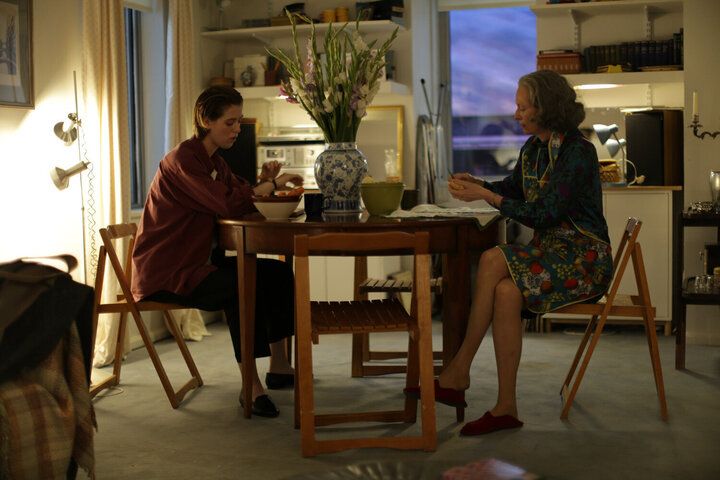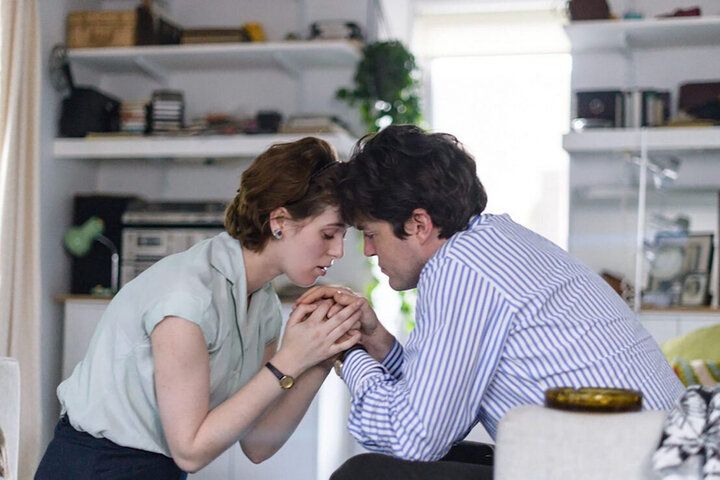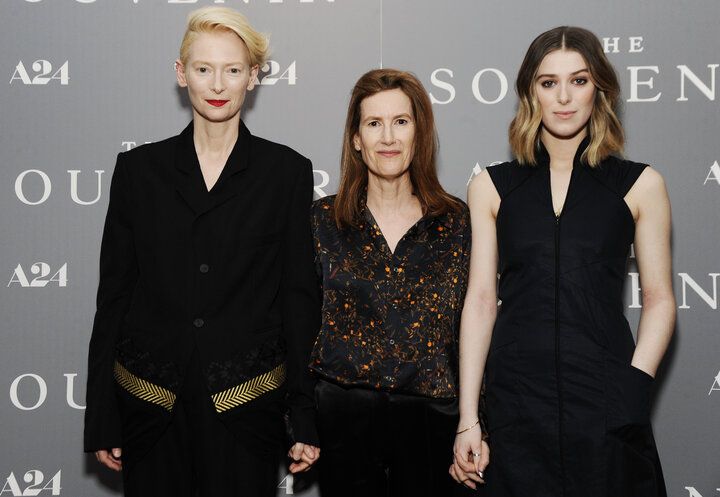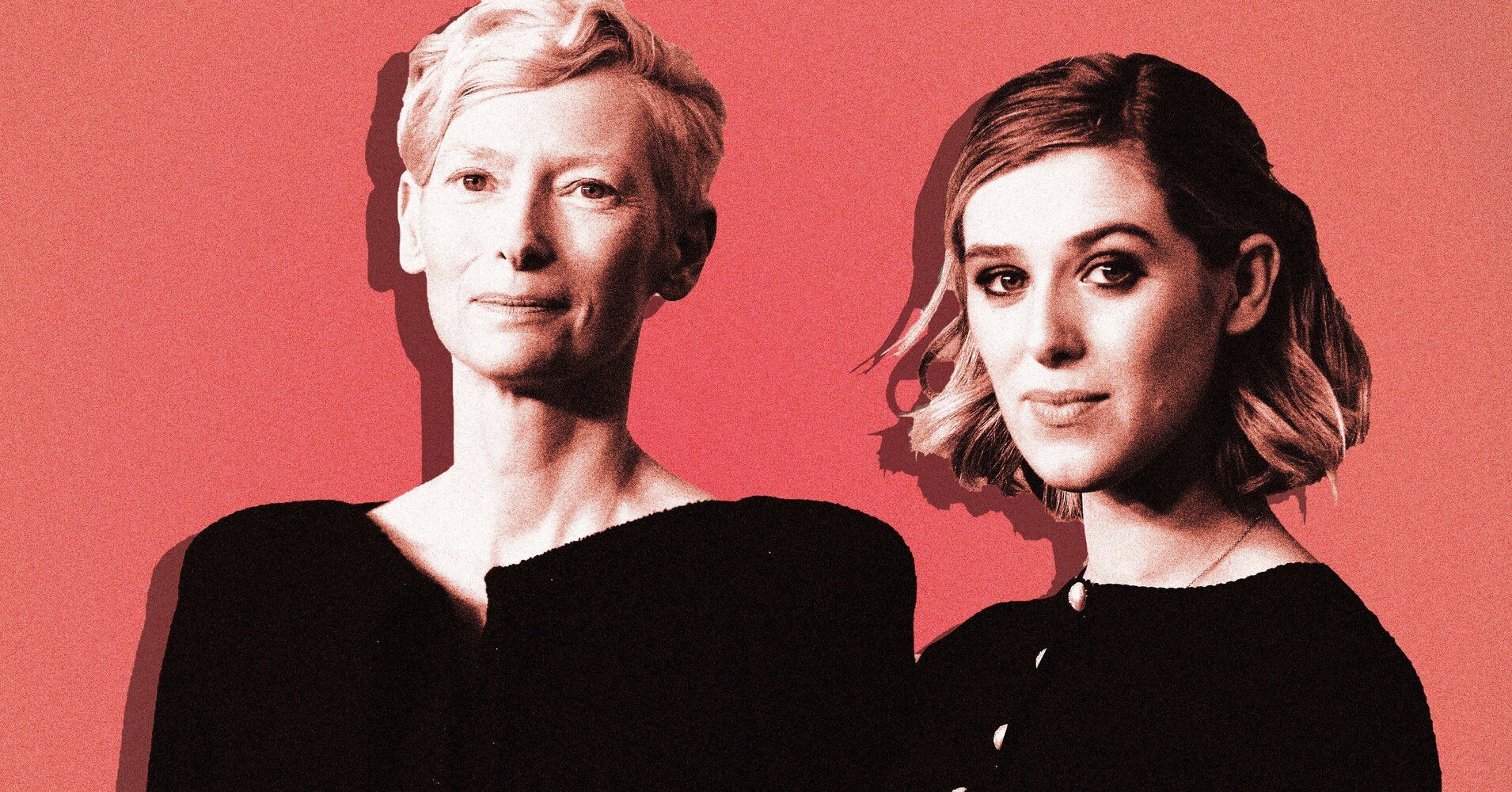[ad_1]
Imagine being Tilda Swinton’s child: When many teenagers’ moms wouldn’t stop posting mortifying comments on Facebook, yours was sleeping in a glass box at the Museum of Modern Art.
But compared to her mother, Honor Swinton Byrne seems relatively normal, hardly the interplanetary eccentric the elder Swinton’s reputation might lead one to expect. Honor says nothing Tilda did as a parent ― from not having a television in their home to calling her daughter an “insanely pagan hippie” ― got under her skin.
At 21, Honor is entering the family business, as well as the fame game, at least for the moment. She stars in the rich romantic drama “The Souvenir,” which opened in limited release this weekend and expands to additional theaters in the coming weeks. The film was made in an unconventional fashion, especially for a first-time actress whose only previous credit is a wordless cameo in the 2009 melodrama “I Am Love.” There was no script, only a premise: In 1980s Britain, a film-school student struggling to find her voice, personally and artistically, begins a messy relationship with a snob (Tom Burke) whose genteel facade gradually reveals an inner darkness. It’s an intimate coming-of-age tale based on an episode in the life of director Joanna Hogg, a close friend of Tilda’s since their collaboration on a short film in 1986. Tilda plays Honor’s mother on-screen, too ― roles they’ll reprise in a sequel that reportedly co-stars Robert Pattinson and is slated to go into production this summer.
In New York last week, I met up with Honor and Tilda at distributor A24′s office, where they reminisced about the films Tilda introduced to her children ― Honor has a twin brother, Xavier; their father is the Scottish playwright John Byrne ― and detailed what it’s like to make a movie together. By the end, we were discussing robots.
What was the Swinton household’s movie diet when Honor was growing up?
Tilda: Well, that’s a question for you.
Honor: We never watched TV. We didn’t have a TV. I never saw any films that any of my friends saw. We had such an individual taste menu of amazing films: Buster Keaton, and Laurel and Hardy, and Hitchcock, and Miyazaki and things like that. It was fantastic because I got a much wider and more colorful and much more international menu of films and experiences that none of my friends got.
Tilda: Do you feel deprived?
Honor: No, but I never saw — and I don’t mind at all — Disney [movies] or anything like that. I never saw any of those films until recently, but all my friends had. I didn’t feel deprived at all, but it was just so different. I just wasn’t a member of that group, so that was interesting.
Tilda: But you’ve introduced them to Miyazaki and Buster Keaton.

So that’s what a Tilda Swinton curation would look like? Hitchcock and Buster Keaton?
Tilda: Hitchcock is interesting because I remember showing Honor and her brother I think it was “39 Steps,” when they were about 10. And I remember him saying word for word after it, “I’d like to see some more work by this director.” The word “work” was pretty impressive, but also the fact that he even knew that this was the work of a director. So I sort of went, “Right!” Over the years, we’ve been spooling it out. But no, it makes them sound like lab rats. We made the decision not to have television, and we’d project films against the wall. They were very cine-spoiled from very early. Both of them have always had this very keen eye and ear for cinema, actually. Your response to Buster Keaton in particular, when you were little, was real. I don’t think it was a hardship. I hope it wasn’t.
Honor: No, of course not. Of course not.
Buster Keaton hardly sounds like a struggle.
Tilda: You haven’t had Béla Tarr yet, “Satan’s Tango.” But they’re free now because they’re grown-ups, so they can go and choose anything they want from now on.
Honor, did you feel like, by the time you were out from under your mother’s roof, you had to make up for lost time and see movies you had missed?
Honor: Very few of them. I remember I went to a Halloween party and I watched a film called “The Chernobyl Diaries.” I really, really get so scared of all that supernatural stuff, and I remember being so shocked at the very negative intention of really wanting to scare you. Not wanting to excite you or intrigue you, but to really scare you to your bone. And that kind of felt like quite a shocking thing because I’d never had that before. If we watched a scary film like “Psycho” or something that is meant to blow your mind, it’s got a deeper and much less superficial, to me, intention. [“Chernobyl”] was a great film, but I felt a little bit allergic to it because I wasn’t used to a film with such a very, very — I don’t know, it wasn’t my kind of thing. I really prefer films with, if they’re going to be scary, a bit of a substance and a bit of psychological something deeper than just making you not want to sleep.
Tilda: I remember that so well. I remember picking you up from that party and they were really indignant. I said, “Was it just that it was violent?” She said, “No, we just found the filmmaking really offensive.”

In the years since your one scene in “I Am Love,” had you even remotely considered accepting another film role?
Honor: No! I wasn’t offered anything or put up or anything like that. In the same way that I wanted to try everything, I really was curious and very excited to one day possibly play a tiny, tiny role in something interesting. I never, ever dreamed that anyone would be interested in me for something so precious and wonderful as “The Souvenir.” I loved it.
Tilda, did it feel like destiny fulfilled, almost, to have a child entering the family business?
Tilda: Well, I don’t see that Honor has entered any business at all. She’s making these two films and, as it happens, was the perfect person for Joanna to cast as Julie. But she’s just starting her life. Who knows what she’ll do? In the same way as I didn’t know when I was her age what I was going to do, and I still don’t know what I’m doing. I quite enjoy not knowing what I’m doing. We’re not a very professional bunch under our roof. We’re amateurs. We just make life up as we go along. I think that sense is very important to try to keep alive, not try to nail someone to the mast too early because life’s too short to do that. In terms of “destiny fulfilled,” both Joanna and I are still pinching ourselves that, in this film about Joanna’s experience, in which I play her mother, who I know very well, my daughter would play Joanna. That is a little bit of a head twist, and we’re still trying to grasp that. But in terms of Honor’s future, no. Since she made the film, she’s been a volunteer in Africa and she’s now hoping to go to university. She’s got a life, and it’s a great part of the beginnings of that life.
Every adult has an anecdote, or perhaps many an anecdote, about embarrassing things their parents did. Yours are different in that they might have occurred in the press or on a big screen. Was there ever a moment when you said, “Mom, why did you say that” or “Why did you do that?”
Tilda: What would I have said?
You did once describe Honor and her brother as your “insanely pagan hippie children.”
Tilda: I stand by that. I don’t know when I said it, but …
Tilda: Yep. I would say at that point, yes. I don’t know about “insanely,” but there was a lot of hair at the time.
Honor, would you describe yourself as “insanely hippie pagan”?
Honor: I don’t know. I mean, what … what …
Tilda: This is the thing. This is what happens: People quote back at you things that you said a very long time ago in some joking conversation with somebody, and they wrote it down and somebody else reads it back to you 10 years later.
Honor: Yes, I suppose I would describe myself as that. I never would come up with those words exactly.
Before taking this role, did you seek counsel from anyone else in the Swinton orbit — perhaps someone like Dakota Johnson, for example, your mother’s former co-star, who also grew up with famous actor parents and opted to enter the business herself?
Honor: No. I was encouraged to do what I wanted to do. It came from myself. I knew that whatever I did choose — whether I decided to do it, or not do it, or whether to ever enter down that road — I would be supported. That was made very clear by everyone around me, by my parents and Joanna and all my friends. I was really lucky in that, and that still stands.

“The Souvenir” had no script. Did you find that freeing or intimidating?
Honor: It was a little bit of both. I wouldn’t say intimidating, really, but it was overwhelming in many ways. Within that freedom, it’s almost like when someone asks what your favorite song is. You have that blank, and you go, “Gosh, I wish there was a slight constraint.” And for someone that thrives off routines and knowing what the plan is and knowing what’s going on, it was very good for me to have a certain spontaneity. I could go as far as I could in any direction at all and know that that was all right. If it was too far or not exactly right, it would be gently guided. It felt very free to me, but in some takes, because I had really no idea what the story was or what I was saying, I could go on complete rants about something. That was all I could do because I had nothing to go on. And that was a time when it possibly would have been time-saving, shall we say, to have a slight guidance. I think finding a delicate balance between having a plan told to me — or not exactly a plan, but having a slight skeleton, but also having the freedom to improvise and be spontaneous. It was very, very interesting having absolutely no idea and having everybody else know what was going on.
Tilda: Not everybody else knew.
Honor: Well, Tom [Burke, the actor who plays Julie’s love interest] and you did.
Tilda: Yes, but nobody else. The only two people in front of this camera in this film who have been in a film before were myself and Tom Burke.
Honor: No, they were all actors.
Tilda: True, I suppose. OK, but point being that, for example, the person that plays Honor’s father is a farmer who also had no idea what was going on. [Burke’s character’s] mother, who rings up to tell the (spoiler alert) news at the end, had no idea that was going to be the story and was told, “You will ring this number at a certain point and you will tell this news.” So you were not the only person that didn’t know.
Honor: Which was comforting because it made me feel slightly less wobbly.
Tilda: And speaking for Joanna, she wanted all of us, but particularly Honor, to have that motor of fluency alive. So I did think you going off on a rant that Joanna knows isn’t going to end up in the film is still valuable to her. It keeps your system going. She would rather see that and keep the chain on the bicycle, in that way, than have you freeze because you know you’ve got to deliver that line and only that. She does work in this very interesting way. She wants people to be alive. She wants them to be people. She doesn’t want them to do any acting.
Even though this was such a different process compared to how the average movie is made, did it live up to the tales you heard from your mother growing up?
Honor: Yes, it really did. It’s so different hearing all these wonderful stories and then being in it yourself. Of course I was on film sets, but I was so apart from it because I was never involved. But then being in it, it was so exciting to be swept along and to be part of the team, to actually be valuable and feel like you’re useful. I had never experienced that before, and it was really good for me to feel part of something I really respected, which was Joanna’s work but also all the fantastic adventure that film can lead to. It was so lovely to be a part of that. It was really, really, really unexpected.
Have you ever received Tilda’s famous email reply that says “Hello, I am away until 01/01/2070 and am unable to read your message”?
Honor: Oh yes, all time. But that’s just your phone, right? It’s an automatic response.
Tilda: Yeah, it’s the robots. They know better than us.
This interview has been edited and condensed.
REAL LIFE. REAL NEWS. REAL VOICES.
Help us tell more of the stories that matter from voices that too often remain unheard.
[ad_2]
Source link

